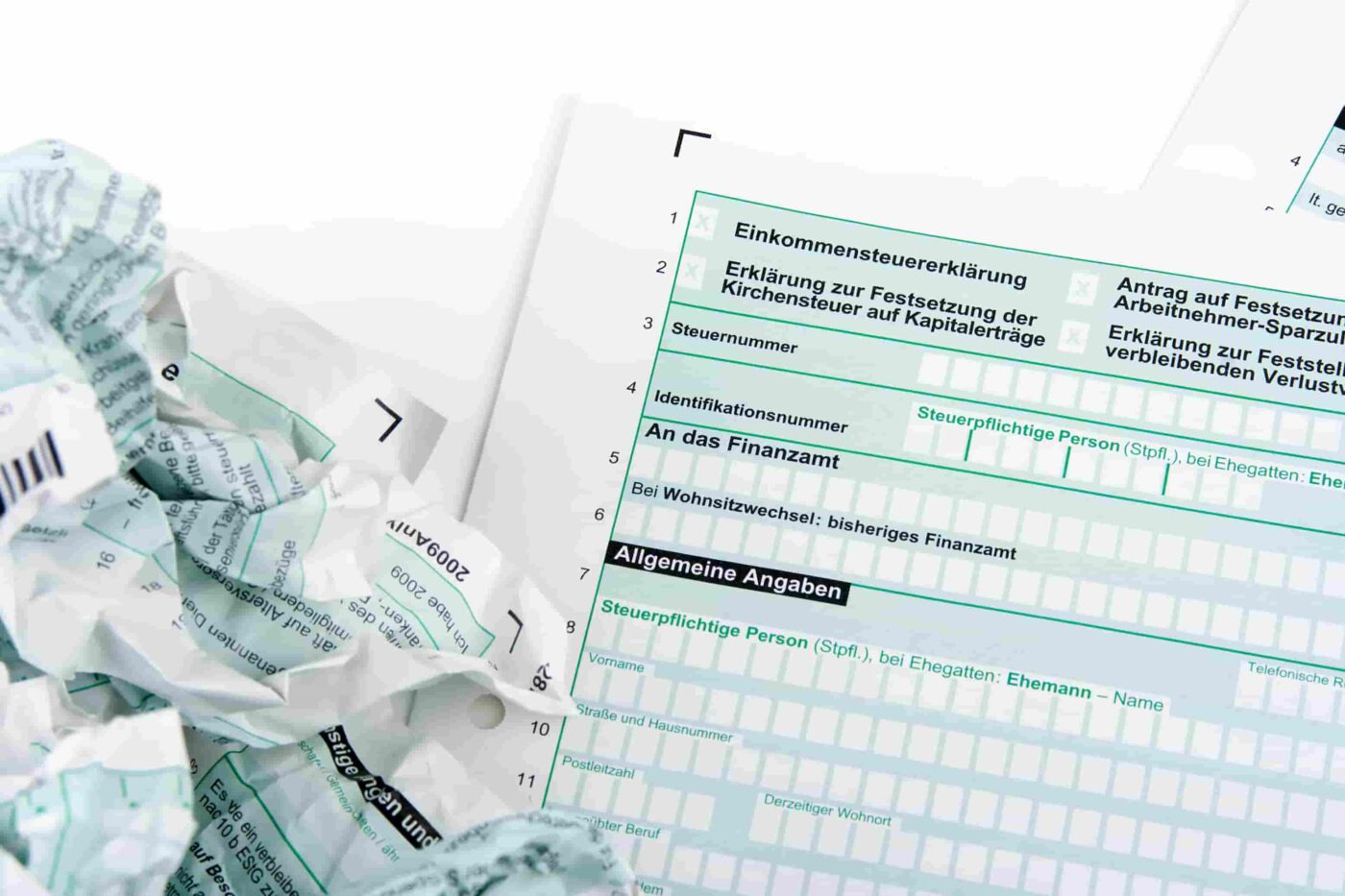Last Updated on January 21, 2025
The German tax return season is upon us, and with the deadline fast approaching, it’s crucial to equip yourself with the knowledge to navigate this annual obligation.
Whether you’re a resident foreigner, expatriate, non-resident property owner, or German citizen, meeting the impending deadline is crucial to avoid penalties.
Many non-resident property owners in Germany, for example, are unaware of their tax filing obligations in both their home country and Germany, as well as the potential benefits of utilizing double taxation agreements and tax deductions.
In this comprehensive guide, you will find everything you need to know about the tax return in Germany and the German tax deadline.
We understand that the process may seem daunting. That’s why we are here to help. In addition to guiding you through the necessary steps, we will also show you who can assist you in filing your annual German tax return, should you require professional tax assistance.
Who is required to file a German tax return?
Filing a tax return is mandatory only in specific situations.
For instance, self-employed workers, freelancers (Freiberufler), and tradespeople must file a German tax return if their income exceeds the exemption limits.
Non-resident landlords in Germany are obliged to file an income tax return both in their home country and in Germany.
Generally, employed individuals in tax class I, who solely earn income from employment, are not obligated to file.
However, there are exceptions. If employed individuals have applied for tax allowances (such as income tax allowance or child allowance), earn additional income, or receive wage replacement benefits, they must file.
You are also required to submit a German tax return if you have received wages from multiple employers simultaneously or earned extra income through pensions or renting/leasing.
The same applies if you are married and you or your spouse are taxed under tax class 5 or 6.
If you are a foreigner who owns property in Germany, our tax advisors can help you with your tax filing obligation. If you have questions, you can request a free call from a tax expert.
What is the tax-free threshold in Germany?
In Germany, if you earn more than €10,908 in the tax year 2023 (or €21,816 for married couples filing jointly), you will have to pay taxes.
The actual amount of tax you pay depends on how much you earn.
What is my tax class in Germany?
When you fill out your German tax return, you’ll need to know your tax class (Steuerklasse).
The tax office usually assigns this based on your marital status when you register in Germany.
Your employer’s tax statement (Lohnsteuerbescheinigung) will also have your tax class mentioned.
In Germany, there are six tax classes:
Class 1 Single, widowed, divorced, or long-term separated
Class 2 Single parent
Class 3 Married with a higher income (than a partner in class 5)
Class 4 Married with an equal income
Class 5 Married with a lower income (than a partner in class 3)
Class 6 Second job or tax deduction without proper employee information
Married couples should pay extra attention to tax classes 3 and 5, as they can help save money if they have different salaries.
If you want to change your tax class, maybe because you earn much more than your partner, you can request a tax class change form from your local tax office.
I am a non-resident landlord in Germany. Which rental expenses can be claimed on my tax return in Germany?
It’s the law to report all rental income in your German tax return. The good news is that you can often deduct associated expenses.
But here’s the thing: lots of landlords in Germany end up paying more taxes on their rental income than they need to.
Why? Well, they miss out on taking advantage of all the allowable tax deductions available to them. Don’t let that happen to you!
Here are some of the rental expenses that you can claim on your German tax return:
- Utility expenses
- Costs for maintenance
- Real estate agent fees
- House renovation costs
- Financial costs
- Defects in the construction
- Appraiser expenses
- Land registry fees
- Business-related travel expenses
- Interest on debt
- Notary fees
- Ground rent
- Janitorial expenses
- Advertising fees
- Accounting fees
- Gardening and lawn mowing costs
- Demolition costs
Read more:
Rental property – What expenses are tax-deductible in Germany
What about double taxation agreements?
More than 90 countries have signed a tax agreement with Germany to prevent double taxation. As an expat living in Germany, if you have already paid income tax in another country, you can avail of this double taxation agreement.
However, a German tax return should be filed if you receive income from German sources.
Our team of tax experts is here to assist you in taking advantage of double taxation agreements.
When is the deadline to file a German tax return?
The deadlines for filing a German tax return vary depending on your tax status. If you’re required to file and do it yourself, you generally have until the end of July of the following year.
Freelancers and self-employed individuals have until 31 July of the following year to submit their German tax returns and income surplus statements.
Due to the pandemic, the deadlines have been extended. For the 2022 tax return, the deadline is 30 September 2023 (extended to October 2, 2023).
For the 2023 tax return, the deadline is 31 August 2024 (extended to 2 September 2024).
What happens if I miss the deadline to file my German property tax return?
Failing to submit your tax returns on time can lead to some unpleasant consequences, such as late charges or penalty payments.
If you miss the deadline, you’ll be charged 0.25% of the income tax you owe, with a minimum of €25 per month.
To make matters worse, the Tax Office might also impose additional penalty payments as a form of punishment.
For the first time you fail to file your tax return on time, you could face penalties ranging from 100 to €500, and even more, if your income is high, with penalties potentially reaching up to €25,000.
It’s important to note that if you’re subject to tax assessment and still don’t file your tax return, the Tax Office will estimate your taxes and demand payment based on that estimation.
This estimated amount is usually quite high since the Tax Office won’t consider any deductible expenses you might have.
While you can appeal the estimate, you’ll still need to submit your tax return regardless.
So, it’s essential to meet the deadline and avoid these unwanted penalties and hassles.
FILE GERMAN PROPERTY TAXES ONLINE
How much does it cost to file a German tax return with a tax advisor?
Tax professionals follow the minimum fees set by the Tax Advisor Remuneration Ordinance (Steuerberatervergütungsverordnung).
However, the final bill depends on the tax advisor’s discretion. This means that different tax advisors may charge different amounts for the same work.
If you are a non-resident landlord in Germany, our tax experts can take care of your tax return liability.
Check PTI Returns’ prices here and learn more about German Property Tax.
Can I file a tax return in Germany for the past years?
If you are obligated to file a German tax return under the compulsory system, you cannot submit it at a later date.
The tax offices are quite strict with the deadlines in these cases and only provide extensions upon formal application.
Fines and penalties may be imposed if you don’t file on time.
Can I file my German tax return in English?
You can only prepare your property tax return in German, and the forms are also only available in German. But don’t worry!
Our tax professionals can take care of all the German paperwork for you, and they will communicate with you in English.
I am a non-resident landlord. How do I file a German property tax return?
There are three primary options for submitting a German property tax return:
- You can go directly to the tax office, where you’ll need to fill out the necessary forms in German, sign them, and lodge the documents in person.
- Use the ELSTER portal, an online registration platform overseen by the Federal Tax Office.
- Get help from our tax professionals. We will deal with all the paperwork and take care of your annual tax return obligation.
Who are we?
Are you a non-resident landlord struggling with tax complexities in Germany?
Meet Property Tax International (PTI Returns), your solution.
Our tax experts specialize in annual self-assessed tax returns in Germany, alleviating your tax worries while you manage your property.
As a part of CluneTech, with over 25 years of experience in international tax, we ensure that you remain compliant with the German tax authorities.
Reasons to Choose PTI Returns:
- More cost-effective than your local accountant
- Our online one-stop-shop simplifies filing in multiple jurisdictions (your home country and Germany)
- Our expertise in international property tax allows us to determine residency status and apply for tax relief. Contact us for a free consultation with our tax experts today. No obligations.



